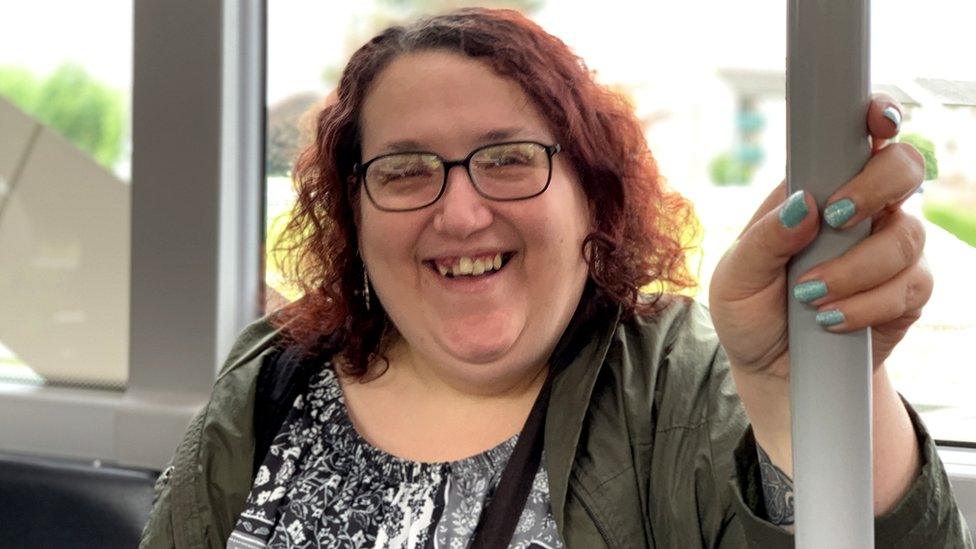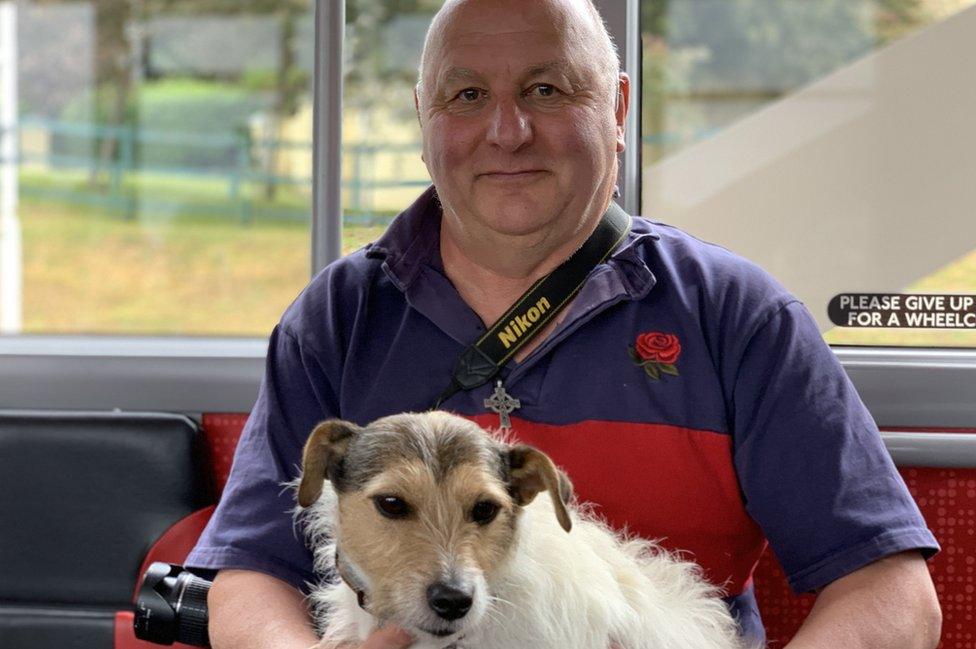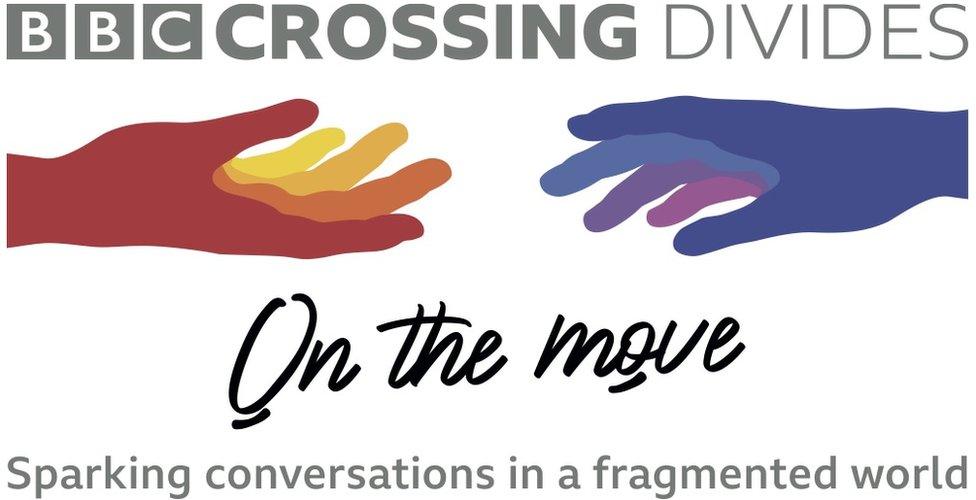Crossing Divides: Can a 'chatty bus' combat loneliness?
- Published
Passengers chatting aboard a bus in Plymouth
The BBC and public transport companies are encouraging people to try talking to their fellow passengers. It's part of Crossing Divides On the Move day, an initiative testing the theory that we benefit from talking to strangers.
Former NHS nurse Kate Smith is a believer.
"When you look up and out, you see that there are some really nice people around," she says.
"And people actually care about who you are and what you've done today."
Kate co-founded Plymouth-based dementia charity Memory Matters.
At the charity's city centre cafe she introduces us to Anne-Marie, Derek and Hazel.
They've agreed to take part in our simple experiment: can a conversation on the bus make you feel happier and less lonely?
Joined by other volunteers, we climb on a double-decker in Plymouth and, at first, ask all our passengers to keep themselves to themselves.
You can picture the scene: headphones in, eyes glued to phones and vacant gazes out of the window.
Then we give our volunteers a simple task: talk to another passenger.
The atmosphere immediately changes.
"It's the best bus I've been on", laughs Anne-Marie.

Anxiety means that she normally "struggles talking to people" and can feel very lonely in a crowded room.
But on our chatty bus she doesn't feel isolated or alone.
"I just feel quite comfortable and there's a good energy around everyone," is the way 19-year-old Hazel puts it.
And for Derek Perry, who describes loneliness as "one of his worst illnesses", the bus is a "happy place".
"We should look at different ideas of how we encourage people to talk to each other."

The enthusiasm is clear in his voice.
Claire Haigh believes there is a "loneliness epidemic" in the UK.
She heads the transport group Greener Journeys, a coalition including bus operators and passenger groups.
Its polling data suggests that a third of people have caught a bus purely to have human contact.
A bus driver, she says, can be the only person that someone communicates with throughout the course of an entire day.
"We need to find ways to create more cohesive communities," she argues. "The bus can do that."
Allow X content?
This article contains content provided by X. We ask for your permission before anything is loaded, as they may be using cookies and other technologies. You may want to read X’s cookie policy, external and privacy policy, external before accepting. To view this content choose ‘accept and continue’.
Now you can get involved.
It is On the Move day, part of the BBC's Crossing Divides season about bringing people together in a fragmented world.
With the help of transport companies, the BBC is encouraging as many people as possible on trains, trams and buses to interact with other passengers or staff.


So what's happening?
Initiatives include:
Virgin Trains designating all coach Cs on its West Coast services as the "chat coach"
Arriva distributing "conversation starter" cards on buses across the country, and encouraging passengers to "share a smile"
encouraging people from different backgrounds to mix on Translink Northern Ireland's Glider service connecting East and West Belfast
National Express deploying actors, poets and games to help trigger conversations on its route 11, which connects Birmingham's most affluent and deprived areas
rail companies Greater Anglia and GTR are also taking part, along with Go Ahead buses and Transport for London
The intention is to spark thousands of conversations and start a national conversation aimed at breaking down society's barriers and combating loneliness.
Prof Nicholas Epley, a behavioural scientist at the University of Chicago Booth School of Business, led research which suggested commuters had a "significantly more positive journey when they connected with a stranger than when they sat in solitude".
He replicated the Chicago experiment with 477 rail commuters on Greater Anglia's lines into London for the BBC.
"The results were replicated almost exactly in terms of people's experiences," he said.
"The thing we are crystal clear on in our analysis is that the Brits in our experiment enjoyed talking to strangers just as our American participants did."
While accepting many people cherish solitude on their journeys, Crossing Divides season editor Emily Kasriel says On the Move day aims to create a greater sense of belonging and break down barriers in society.
"Contributing to social cohesion is part of the BBC's public purpose," she says, adding that participation "should be fun and is, of course, voluntary."
What do people make of the idea?
It's not everybody's cup of tea.
"No thank you. My mornings are for drinking my coffee and listening to music," website reader Stephen Mortimer told the BBC. "Thankfully big headphones generally signal to people that I'm not interested in a conversation."
Another, Vicente, wrote: "I'm a Londoner. There are over eight million of us living here. I work in an open-plan office with constant interaction. Forgive me for valuing my downtime on public transport by burying my head in a book."
Allow X content?
This article contains content provided by X. We ask for your permission before anything is loaded, as they may be using cookies and other technologies. You may want to read X’s cookie policy, external and privacy policy, external before accepting. To view this content choose ‘accept and continue’.
However, many others were more positive.
"In 2005, an American tourist asked me if she was on the right tube line for Kew Gardens, which coincidentally was where I was heading also," said one correspondent. "We've been friends ever since."
Another wrote: "I forced myself to push past my own shyness... back in the 70s. I've stuck with that approach throughout the years in many countries and it sure makes my day."
Allow X content?
This article contains content provided by X. We ask for your permission before anything is loaded, as they may be using cookies and other technologies. You may want to read X’s cookie policy, external and privacy policy, external before accepting. To view this content choose ‘accept and continue’.
The BBC's Emily Kasriel adds: "If we dare to open ourselves up to strangers and risk an encounter with the unknown, we may energise ourselves, gain new perspectives, and help tackle isolation."

Have you had a great chat to a stranger on public transport? Email us at haveyoursay@bbc.co.uk, external
Please include a contact number if you are willing to speak to a BBC journalist. You can also contact us in the following ways:
WhatsApp: +44 7555 173285
Tweet: @BBC_HaveYourSay, external
Send pictures/video to yourpics@bbc.co.uk, external
Text an SMS or MMS to 61124 or +44 7624 800 100
Please read our terms of use and privacy policy
- Published13 June 2019

- Published12 June 2019
